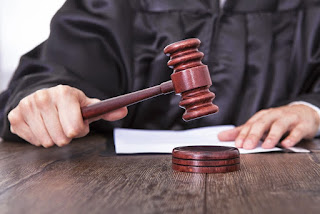Post-conviction Bail
The biggest factor in determining whether bail after conviction will be allowed is the nature of the crime and the length of the sentence. In Florida, anyone convicted of a violent crime, including murder, rape, and aggravated battery, will not be eligible for bail while waiting on appeal. Bail won't be allowed when the sentence is for a substantial amount of time, as courts are concerned the desire to avoid a long prison sentence will encourage too many people to skip town while their case is on appeal.
Judicial Discretion
While state law sets the boundaries for what kind of bail after conviction is allowed, a defendant does not have the right to stay out of prison while their conviction is appealed. The trial court judge has significant discretion in deciding whether or not to allow bail. The judge will consider a number of factors, such as whether the defendant is a flight risk, whether they pose a risk to the community, and whether there is any legitimate ground for the appeal.
The agents at A Wesley Chapel Bail Bonds LLC have decades of experience working within the criminal justice system. Our bail bonds service can help you with pre-trial or post-conviction bail, and answer all your questions along the way. Contact us today for assistance.
